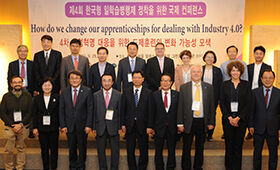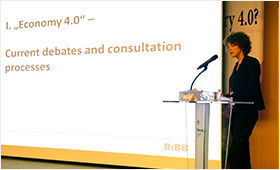How do we change our apprenticeships for dealing with Industry 4.0?
The 4th KRIVET International Conference on Apprenticeships
At the 4th International Conference on Apprenticeships of the Korea Research Institute for Vocational Education and Training (KRIVET), international experts shared their knowledge and country experiences, highlighting the recent trends of apprenticeships particularly related to Industry 4.0 and strategies for the future industry. The conference sought to give a detailed picture of apprenticeship systems in other parts of the world.

Which competencies will be required for the world of work 4.0? How can vocational education and training adapt to changing requirements at the workplace?
These and other questions were discussed by vocational education and training experts at the well-attended 4th International Conference on Apprenticeships. The conference, organised by the Korean Research Institute for Vocational Education and Training (KRIVET), took place on 28 September 2017 in Seoul, Korea. In the conference, international experts shared their knowledge and country experiences, highlighting the recent trends of apprenticeships particularly related to Industry 4.0 and strategies for the future industry.
The BIBB was invited as longstanding partner institution of KRIVET and as the centre of competence for the development of VET in Germany to provide insights about the current debate and ongoing research projects on VET 4.0 in Germany.

The presentation by BIBB highlighted important characteristics of the German dual vocational education training system, which already offers a number of starting points for responding to changing demands in the labour market. In addition, Eva Hanau, research associate at BIBB, also discussed crucial challenges for the German vocational education and training system for successfully managing the emerging structural change and the future of Germany as a business location in the long run. One of the key findings of BIBB's ongoing research projects is that systems understanding and IT knowledge will be increasingly relevant for all occupations in the future.
Background
According to experts, the advent of the Fourth Industrial Revolution is leading into a period of great transformation. The current wave of digital transformation is rapidly changing industrial production processes not only in the manufacturing sector but also in the distribution, health and education sector. The Internet of Things (IoT), Cyber-Physical System (CPS), artificial intelligence (AI) and other innovations facilitate a more software-driven, individual and efficient way of producing goods and services.
The Fourth Industrial Revolution has also brought changes in the supply and demand of workforces and skillsets in the labour market. According to the report of the World Economic Forum 2016, it is expected that more than 5 million jobs will disappear and more than 35 percent of occupations' core skillset will change in 15 countries in 5 years. This change in the world of work will present a formidable challenge to work-based learning and apprenticeships.
If the Fourth Industrial Revolution is to be a success, an important ingredient is bound to be the mass upgrading of the digital skills of workers, which will enable them to keep up with the pace of technological progress. This means that policymakers are primarily concerned with reskilling and upskilling opportunities for companies, employees and skilled craftsmen.
This is the fourth time KRIVET organised the International Conference on Apprenticeships. The first one provided an overview of apprenticeship systems and their quality management frameworks in various countries. The second one looked into policies of developing and operating apprenticeship programs and evaluation and support services of apprenticeships. The third one focused on costs and outcomes of apprenticeships and the ways to encourage companies’ participation and investment in apprenticeships. The most recent conference explored current trends in the field of apprenticeships particularly related to Industry 4.0 and strategies for the future industry.
About KRIVET
As a public research institute on vocational education and training policies, Korea Research Institute for Vocational Education and Training (KRIVET) organised this international conference with support from the Korean Ministry of Labor and Employment (KMOEL) and HRD Services of Korea (HRDK), to bring together policy approaches from various countries to examine their current trends and strategies of apprenticeships in regard to Industry 4.0.